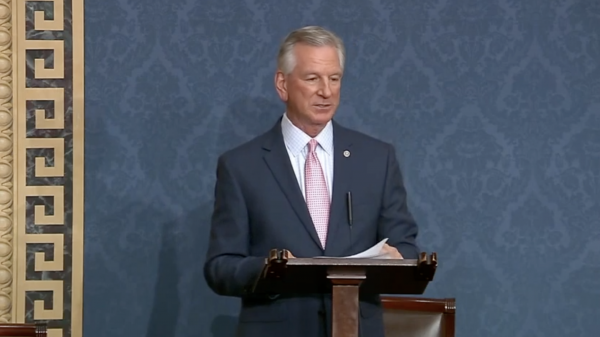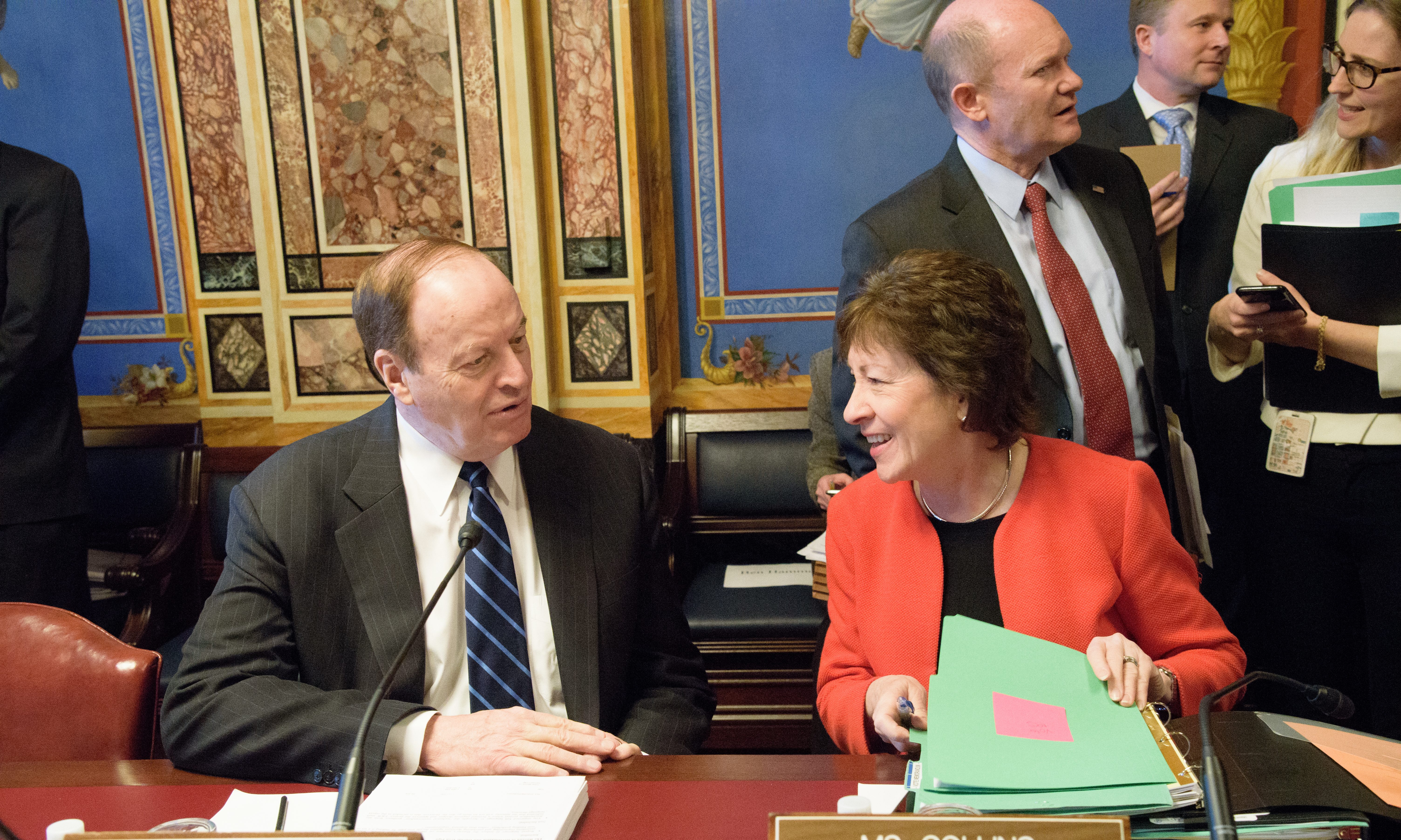Tuesday U.S. Senator Richard Shelby (R-Alabama) applauded the return of a normal appropriations process in a speech Shelby delivered on the Senate floor.
“Just three months ago, Congress passed and the President signed a $1.3 trillion omnibus spending package for fiscal year 2018,” Sen. Shelby said. “No one had time to read it, much less an opportunity to amend it. The President vowed that never again would he sign such a measure. Collectively, we lamented the absence of process and the excess of partisanship that led to that point once again. The collapse of regular order had become the new normal, despite our usual resolutions to revive it.”
Senator Shelby became the Chairman of the powerful Senate Appropriations Committee in April after Sen. Thad Cochran (R-Mississippi) retired due to declining health.
“I am pleased to report today that the Senate Appropriations Committee has charted a different course in the months since the fiscal year 2018 omnibus became law,” Chairman Shelby stated. “In April, I began working with Vice Chairman Leahy and our colleagues on the Appropriations Committee to put into motion an aggressive schedule to mark up all twelve appropriations bills before the July 4th recess. Thus far, the Committee has passed seven of these bills. This week, the Committee will mark up three additional bills, and in the final week of June we will consider the remaining two. We are right on schedule.”
“What has been truly remarkable, however, is not the speed of the fiscal year 2019 appropriations process but the bipartisanship that has given it new life,” Shelby said. “All seven of the bills passed by the Committee thus far have garnered overwhelmingly bipartisan support. Most of them, in fact, have been approved unanimously. This is no small accomplishment in today’s partisan political environment. On this point, I want to pause and recognize the significant contributions of Vice Chairman Leahy to this effort. Senator Leahy and I have known each other for many decades now. In fact, our combined years on the Appropriations Committee exceed the age of many of our colleagues. On this basis, we came together at the outset of the process and determined that only by uniting would appropriations bills make it to the Senate floor. He and I made a deal, the essence of which Politico succinctly summarized in the headline of a recent article titled, “Poison pills banished from Senate spending bills.” As part of this deal, Vice Chairman Leahy and I agreed to reject not only partisan riders but also new authorizations in the 2019 appropriations bills. We resolved that senators on both sides looking to authorize new law in appropriations bills would be referred to the appropriate authorizing committees.”
“As the appropriations process has unfolded, I have honored this deal. Vice Chairman Leahy has honored this deal,” Chairman Shelby continued. “Our subcommittee chairmen and ranking members have honored this deal. And the results speak for themselves. Just last week, for example, the Interior, Environment, and Related Agencies appropriations bill passed unanimously out of committee. Madam President, you would have to go back nearly a decade to find the last time the Interior bill garnered such strong bipartisan support. I recognize that we are still early in the game here, and that many contentious issues lay ahead. But I believe that we have established a framework for success in returning to regular order. It is now time to translate this success to the Senate floor. Through their discipline in adhering to this framework, members of the Appropriations Committee have demonstrated that their perennial calls for a return to regular order were not hollow. Today we will begin to discover whether the full Senate is equally sincere in its resolve. The package before the Senate combines three fiscal year 2019 measures recently approved by the Appropriations Committee: the Energy and Water Development appropriations bill; the Military Construction, Veterans Affairs and Related Agencies appropriations bill; and the Legislative Branch appropriations bill.”
“The Energy and Water Development bill provides $43.7 billion in discretionary funding, a $566 million increase over the FY18 enacted level,” Shelby continued. “The bill addresses critical national security needs concerning nuclear energy while also improving our water infrastructure and investing in basic science and energy research. Senators Alexander and Feinstein, the chairman and ranking member of the Energy and Water Development Subcommittee, have crafted a balanced, bipartisan bill that passed the full committee by a 30-1 margin.”
“The Military Construction, Veterans Affairs and Related Agencies bill provides $97.1 billion in discretionary funding, which is $5.1 billion above the level enacted in FY18,” Shelby said. “This bill supports investments that will ensure maximum readiness and warfighting capability for our troops, while also providing funding for needed improvements and innovations at the VA. Senators Boozman and Schatz, the chairman and ranking member of the Milcon-VA Subcommittee, wrote a strong bill that received the unanimous support of the full committee.”
“Finally, the Senate’s Legislative Branch bill provides $3.3 billion in discretionary funding, which is $68 million above the 2018 enacted level,” Sen. Shelby stated. “This bill makes important investments in the safety and security of those working in Congress and those visiting our Capitol. Chairman Daines and Ranking Member Murphy of the Legislative Branch Subcommittee, also drafted a strongly bipartisan bill that garnered the unanimous support of the full committee.””
Shelby thanked, “Chairmen Alexander, Boozman, and Daines; Ranking Members Feinstein, Schatz, and Murphy,” for their continued hard work and leadership. “Vice Chairman Leahy and I are committed to an open amendment process, as are each of the subcommittee chairmen and ranking members who will be managing their respective parts of this package.”
“To recap for the benefit of all Members: We are not interested in poison pill riders,” Shelby told his fellow senators. “We are not considering new authorizations of law. But we are interested in discussing substantive amendments that are germane to this package. This is the path that leads back to regular order. It is my hope that we will not be led astray down the path of delay and partisanship that results in yet another omnibus. That is no way to fund the government.”
The Congress left normal order and began passing a series of continuing resolutions and omnibus bills in 2009. At no point did President Barack H. Obama (D) ever sign a normal budget, even when the Democrats controlled the Congress. Instead a C.R. would pass, usually with leaders from the majority and leaders from the minority agreeing to continue funding both their priorities and the priorities of the other party. Along with this came periodic increases in the national debt limit. While the Great Recession and the TARP bailouts contributed greatly to the deficits, over $7.9 trillion was added to the national debt (more money than under any other president).
Despite a roaring economy and record low unemployment, the debt has kept growing under President Trump. The deficit is currently $774 billion. Most federal spending, however, is so-called mandatory spending on entitlements and interest on the debt. Discretionary spending is increasingly a smaller portion of total federal outlays.























































